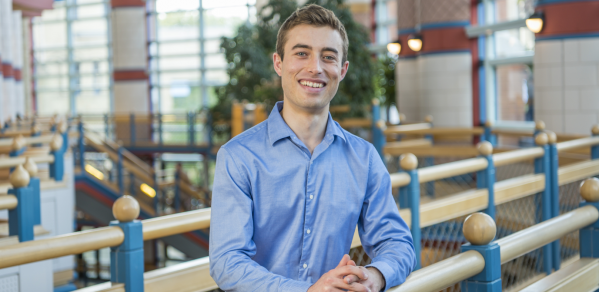
PhD student Dante McGrath represented the University recently at the Global Young Scientists Summit (GYSS) 2021. This year’s theme was ‘Advancing Science, Creating Technologies for a Better World’.
This was an excellent opportunity to showcase my research to students outside my own field.
Dante McGrath
The annual Summit provides a platform for conversations on science and research, technology innovation and society, and solutions to global challenges. Dante was among 500 graduates and postdoctoral fellows in attendance. Held virtually this year, the Summit featured plenary lectures and panels with leading scientists, including Nobel Laureates and recipients of the Fields Medal, Turing Award, and Millennium Technology Prize.
Dante’s research investigates the behaviour of liquids during combustion, in particular the role of droplets in premixed combustion. Here, in his own words, Dante shares some highlights of his experience at the Summit:
I was thrilled to be nominated by the Department of Engineering to represent the University at the Summit. This was an excellent opportunity to showcase my research to students outside my own field. I especially enjoyed my discussions with fellow experimentalists, which exposed me to new perspectives and attitudes to lab work from disciplines such as biochemistry and biomedical science. Meeting so many people gave me unique insight into the most active fields of research where the next great discoveries could happen!
One highlight of the Summit was the panel on science and policy. A key takeaway was the importance of cross-disciplinary engagement to solve grand challenges. My research investigates the role of droplets in premixed combustion; the outbreak of COVID-19 means that my knowledge in aerosol science has broad implications beyond my own discipline. It inspires me to think that combustion scientists might play a key role with medical researchers in combatting transmissible diseases.
Closer to home, the panel on renewable energy was a valuable reminder of the climate action goals motivating my research. Whilst the pandemic has dramatically reduced emissions caused by the aviation industry, demand for air travel is likely to return to unsustainable levels. Optimising the combustion process therefore remains imperative.
I greatly valued the words of wisdom from all speakers throughout the Summit. I was especially inspired by Dr Venki Ramakrishnan (Nobel Prize in Chemistry, 2009). His academic journey is a lesson in keeping an open mind; he embraced new techniques, moved from one city to another, and even changed fields – all in the pursuit of research. This impressed upon me the need to be nimble as a young scientist in an ever-changing world. I think this principle will serve me well as I pursue my career in science. He also shared four keys to success in research: money, skill, patience, and luck. If only I could have them all in equal measure!
It was a privilege to engage with current and emerging scientific leaders, united by a passion for discovery and sustainable development. I would like to thank the School of Technology and the Cambridge Centre for Advanced Research and Education in Singapore (CARES) for granting me the opportunity to represent the University at GYSS 2021.

